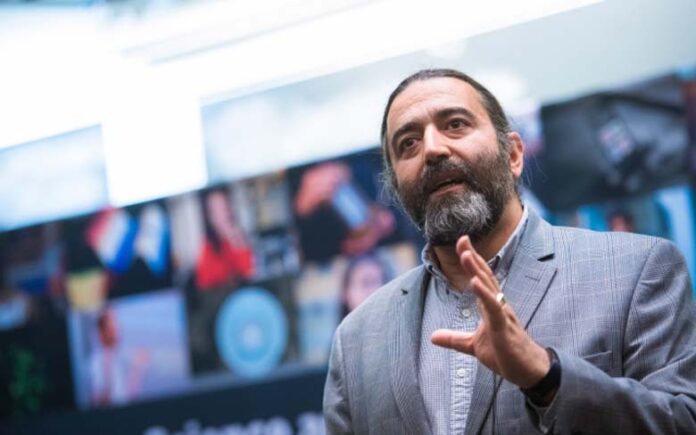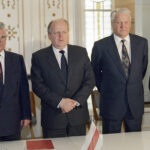In September of this year, MIT’s Department of Earth, Atmospheric, and Planetary Sciences decided to cancel the prestigious Carlson Lecture, which was going to be delivered by Professor Dorian Abbot. The reason for the cancellation, as it transpired, was the complaints by a number of alumni and students about a Newsweek article co-authored by Professor Abbot where he critiqued Diversity, Equity, and Inclusion (DEI) efforts on academic campuses. This cancellation has led to a major controversy at MIT, causing many faculty to question whether MIT is truly committed to the highest principle of academia – that of freedom of thought. To understand the scale of the problem, three Institute-wide faculty meetings on freedom of expression were convened and polls were held to gauge the climate. During one of these polls, 52% of the participating faculty indicated that they feel that their voice, or the voices of their colleagues, are constrained at MIT on an everyday basis. Additionally, 77% indicated that they are worried that the current atmosphere in the society is jeopardizing their voice.
You can agree or disagree with Dorian Abbot’s views on DEI (I personally disagree with them, and with the way in which he chose to word them). However, to state that DEI is off limits for criticism is absurd. Deifying DEI would turn it into the opposite of freedom of speech. This would be the worst outcome, as it is bound to hurt DEI efforts. Such reductionism would drive us into the zero sum “you are with us or against us” dangerous sectarian mindset that was and still is common in the former Soviet space where I grew up. It is also dangerous to demand rejection of thinkers who disagree with a university’s current policies: such an approach throughout history would have resulted in universities that would still be governed by their 19th century racist and sexist policies. It is precisely the openness to criticism that has allowed progress and reform in academia.
I grew up in Soviet Armenia in a family of physicists. As such, I saw firsthand what damage Soviet-style “political correctness” inflicted on Soviet scholarship and scientific thought.
To this day academic and scientific institutions in the former USSR have not recovered from that blight. Humanities and social sciences became tools of ideological propaganda, weapons of indoctrination by Soviet authorities. Critical thinking was discouraged and replaced with endless repetition of “truths.” Expressions of “dangerous ideas” were punished. STEM fields didn’t escape the scourge of Soviet political correctness. Trofim Lysenko, a pseudoscientist botanist, “proved” in the 1920s that plants’ properties were entirely determined by the environment and declared genetics a false “bourgeois science” – a conclusion adored by his Marxist overlords, who could then extrapolate to humans and claim that humans are entirely shaped by their environment. The Lysenkovshchina campaign that followed enforced political orthodoxy in the sciences and brought about the destruction of Soviet genetics: even in the 1980s our textbooks on biology had barely any serious discussions on the workings of DNA. The message to Soviet scientists was simple: keep quiet, toe the party line, and never produce any science that contradicts the ideological orthodoxy du jour. The few heroic dissidents who did (Andrey Sakharov, Yuri Orlov, et. al.) were punished with professional and social ostracism (or “canceled,” to use today’s terminology). It is then of no surprise that the Soviet intellectuals – who should have been the loudest voices – instead kept mute and silent while autocracy and corruption flourished after the collapse of the USSR.
When I immigrated to this country in 1993, I was exhilarated by the culture of tolerance of different opinions: seeing two colleagues with diametrically opposite political views working together was nothing short of amazing for me at the time. After the oppressive atmosphere of Soviet thought it felt like a breath of fresh air. “I disagree with you but I will fight for your right to state your opinion” – this is one of the uniquely American values that I hold most dear to my heart. I grew to believe that it is our tolerance towards diversity of opinion that makes America such a vibrant and unique country. And it is diversity of thought that fosters innovation and scholarly pursuit without which we would suffer the kind of stagnation that ultimately undid the Soviet Union.
Some might be tempted to dismiss these comparisons as a hyperbole: after all, America is so different from the USSR . . . surely it can’t happen here. To those who think this I simply ask: Would you have guessed in 2014 that in just a few years we would have an extremist like Donald Trump as a president? As someone who grew up in the USSR I am very worried that the vector of our social momentum is increasingly pointing to that of the Soviet Union. Over the last 10 years we have seen a real erosion of American liberal values and a rise of ideological intolerance. The Abbot incident is by far not the only one – there have been many other ones (Foundation for Individual Rights in Education lists 471 such incidents since 2015). Furthermore, the issue is a very bipartisan one: the attacks on freedom of speech are by no means only from the extreme left, but also from the opposite side of the political spectrum, as illustrated by the 2014 firing of Steven Salaita from his job at UIUC over his criticism of Israel. We now see a rise of political correctness and cancel culture in academia that is eerily similar to many aspects of Soviet thought.
It has been correctly stated that the freedom of speech is not absolute. To quote – freedom of speech comes with consequences. True. However just as there are some limits on speech, there should also be a proportionality and reasonableness in consequences.
For example, if a biologist spreads false information about AIDS being a “myth,” as Professor Peter Duesberg of Berkeley did in the 2000s, then it would be justified for him to be excluded from the process of scholarly knowledge production in his field on the grounds of engaging in highly dangerous pseudoscience (Duesberg’s lobbying in South Africa has been estimated to have contributed to 330,000 avoidable deaths from AIDS). On the other hand, if a legitimate climate scientist expresses political views that don’t sit well with the university policies, that is not grounds enough to cancel their public lecture on climate science. Because it amounts to censorship.
There are some faculty who will justify ostracism of scientists holding views similar to Abbot’s, e.g., by stating that minority students on campus experience exclusion and feel marginalized by the very presence of scientists who hold such “extreme opinions.” This view assumes three axioms: that Abbot’s views are extreme; that the minority students suffer by feeling marginalized; that students should be protected from any form of ideological discomfort on campus. Let’s start with the first one: is there any evidence to show that Abbot’s views are extreme? Pew Research conducted a survey in 2019 of various demographic groups in America, which indicated that 73% of Americans believe that race should not be considered as a factor during university admissions. Sixty-two percent of African Americans agree with that view as well. Next: is there any evidence that the minority students suffer? For example, is there any data showing that academic performance of minority students drops after visits of speakers who hold views similar to Abbot’s? Do we see a reduction in applications to MIT after such visits? I am not aware of any data that corroborate such an assertion. And finally the third: do the students need to be ideologically protected? While a university should be a space that is free of harassment and racism, higher education is not supposed to be comfortable or easy. Students should be taught to grapple with controversial ideas, to hear out and debate difficult and even offensive concepts.
Other than the above argumentation for the decision to cancel speakers with dissenting views, we hear some colleagues mention that it is the students who do not want to hear voices that criticize DEI. I am not aware of any hard evidence that supports this view. In fact, Gallup Inc. has performed surveys of university students’ opinions of freedom of speech, including speech on campus. Their 2020 survey involving about 3000 students across many campuses indicated that 80% of the participants believe that students should be exposed to all types of speech without any prohibitions thereof. These numbers are important for two reasons: they evidence a readiness on the part of the students to engage in difficult debates; they counter the widely held stereotype that “kids these days” are fragile snowflakes in need of a university bureaucracy that plays the role of the ideological nanny. Perhaps the problem is not “kids these days” but rather the “administrators these days” who are too fragile to deal with the slightest controversy?
Here at MIT, a Values Statement Committee recently drafted a proposed set of MIT Values; the proposed set includes charming statements about “quirkiness” and “nerdiness,” but does not have even a single clear stipulation on freedom of thought. The list does include welcome features like creativity, originality, and (my favorite) creative irreverence – but how can those be practiced without free thinking? Does this imply that on an administrative level MIT doesn’t consider such freedom a value worth mentioning?
The poll results from the MIT faculty meetings on freedom of expression acutely illustrate the crisis that we are in: there is an atmosphere of fear among faculty. A fear that is bound to cripple honest scholarship and free scientific pursuit. It is thus paramount that MIT makes a clear statement formulating its position on the issue. I believe that the Institute needs to take multiple urgent steps that are necessary to rectify the situation. Those should include, at the very least:
- A faculty-led MIT committee on academic freedom which will:
- Work with faculty, students, and staff to achieve a deeper understanding of the climate on campus;
- Produce a statement on the part of MIT, similar to the Chicago principles, that clearly articulates the importance and the meaning of academic freedom;
- Ensure that future revisions of the MIT Values include clarification on MIT’s commitment to academic freedom and on how this concept is intermeshed with the other stated values.
by Areg Danagoulian
Areg Danagoulian is an Associate Professor of Nuclear Science and Engineering at MIT.













